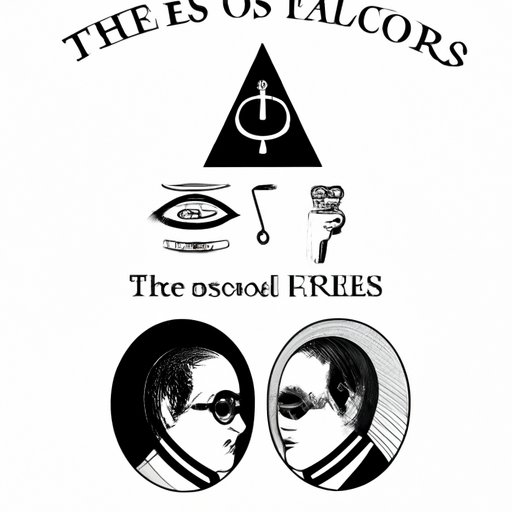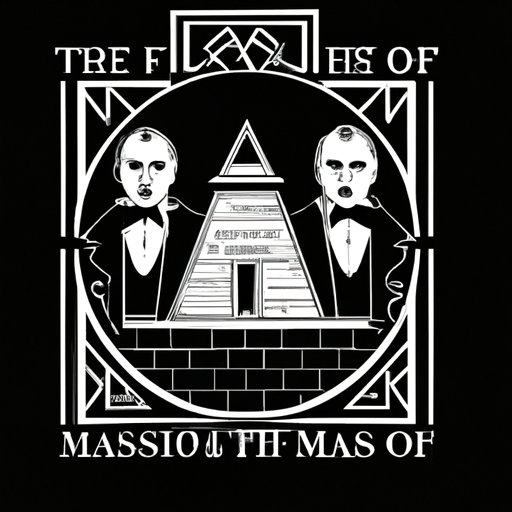
Introduction
When you hear the term ‘Free Masons,’ you may be conjuring up images of secret handshakes, mysterious symbols, and underground meetings. But what are Free Masons really? In this article, we’ll take a deep dive into the origins and history of the secret society, explore its inner workings, and debunk the conspiracy theories surrounding it. We’ll also examine the moral and ethical values practiced by Free Masons, and its impact on modern society. Whether you’re a curious outsider or a member of the fraternity, this article will provide you with a comprehensive guide to understanding the world of Free Masons.
The Origins and History of Freemasonry: What You Need to Know
Free Masonry is one of the oldest and most mysterious organizations in the world. It is believed to have emerged in the late-16th century in Europe. But the exact origins of Free Masonry are shrouded in mystery. Some historians believe that the organization was formed by medieval stonemasons, while others attribute its birth to Enlightenment-era intellectuals seeking to promote science, democracy, and liberty.
The first Grand Lodge of Free Masons was established in London in 1717, marking the beginning of the modern era of the organization. The basic structure of Free Masonry, with its three degrees (‘Entered Apprentice,’ ‘Fellowcraft,’ and ‘Master Mason’), was also formalized at this time. The organization continued to evolve and grow throughout Europe and America over the next few centuries.
Today, Free Masonry is a truly global fraternity with an estimated membership of six million members worldwide.
Inside the Secret Society of the Freemasons: A Comprehensive Guide
The Masonic organization is structured hierarchically, with local lodges overseen by regional and national Grand Lodges. Membership in Free Masonry is by invitation only, and each candidate must go through a rigorous initiation process known as ‘degrees.’ The initiation process involves being led through a series of symbolic rituals and ceremonies.
Meetings of Free Masons are typically held in secret, and much of what goes on inside is not disclosed to outsiders. That said, there are some rituals and traditions that have been made public over the years. These include the wearing of certain clothing, the use of secret handshakes and passwords, and the display of certain symbols and emblems.
In terms of its role in society, Free Masonry has involved itself in a variety of charitable activities over the years, including supporting hospitals, schools, and other institutions. The organization has also been involved in various political and social causes throughout its history.
Decoding the Symbols and Rituals: Understanding Freemasonry
The symbols and rituals used by Free Masons are a key aspect of the organization’s identity. They are used to convey important moral and ethical messages among members, and many of them have special significance to the organization.
Some of the most common symbols used in Free Masonry include the square and compass, which represent order and balance, the All-Seeing Eye, which represents knowledge and enlightenment, and the letter ‘G,’ which symbolizes God or Geometry, depending on the interpretation.
The rituals used by Free Masons are complex and sometimes difficult to understand for outsiders. However, they are designed to convey important moral messages, such as the importance of honesty, integrity, and brotherhood.
Free Masons and American History: The Connection Explained
Free Masonry has been a part of American history since its earliest days. Many of the Founding Fathers, including George Washington, Benjamin Franklin, and John Hancock, were Free Masons. The organization played a significant role in the American Revolution, with many Free Masons supporting independence from England.
In the years that followed, Free Masonry continued to be an important part of American life. The organization has had a presence in American politics since the earliest days of the republic, with many politicians and public figures being members of the fraternity.

The Famous Free Masons Who Shaped the World We Live In
Throughout history, Free Masons have played a crucial role in shaping society and culture. Some of the most famous historical figures who were also Free Masons include Mozart, Benjamin Franklin, and George Washington. In modern times, notable Free Masons include Buzz Aldrin, Arnold Palmer, and Winston Churchill.
Free Masons have contributed in a variety of ways to society and culture, including the arts, sciences, and politics. Many aspects of modern Western society, including government, technology, and culture, have been shaped in part by Free Masons.
The Truth Behind the Conspiracy Theories Surrounding Freemasonry
Like many secret societies, Free Masonry has been the subject of numerous conspiracy theories over the years. Some of the most common conspiracy theories surrounding Free Masonry include rumors that the organization is a front for the Illuminati, that it is involved in secret cult practices, and that it seeks to impose a New World Order.
However, most of these conspiracy theories are unfounded and lack any real evidence. In fact, much of what the organization does is charitable in nature, and its mission statement emphasizes brotherhood, honesty, and morality.
Exploring the Moral and Ethical Values Practiced by Free Masons
One of the core principles of Free Masonry is the importance of ethical values and morality. Members of the organization are expected to uphold principles such as honesty, loyalty, and integrity. They are also expected to work towards promoting social justice and equality.
The relevance of these ethical values in modern society cannot be overstated. In a world that often seems to lack basic moral values, organizations like Free Masonry offer a refreshing alternative.
Conclusion
Free Masonry is a complex and mysterious organization with a long and storied history. Despite its reputation as a secret society, much of what the organization does is simply charitable in nature. Its members are bound by a commitment to morality, ethics, and social justice, and many of the values promoted by the organization are sorely needed in modern society. Whether you are a curious outsider or a member of the fraternity, understanding Free Masonry is an important step towards appreciating the complexities of the world we live in.




